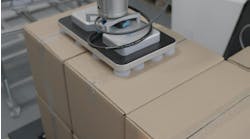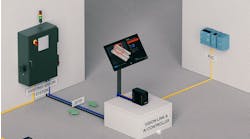The swift spread of the Coronavirus has impacted both human lives and business systems across the globe dramatically and detrimentally. Within a few short months, most companies have incurred degrees of financial damage that will take years to rebuild. Properly programmed unmanned vehicles (UVs) can help mitigate the losses and Aquiline Drones (AD) is preparing to power them with the industry’s first drone-dedicated cloud, AD Cloud, this May.
“Around the world, authorities are turning to drones in the battle against the Coronavirus pandemic, using them to remove humans from the risk of infection,” said Barry Alexander, founder and CEO of Aquiline Drones. “But not all drones are created equal in that the brains behind a specific mission lies within its customized cloud computing capability. At Aquiline Drones, we have harnessed the intelligence of aviators, systems engineers, and IT gurus to ensure safe, sophisticated, and successful commercial drone applications for any type of hardware.”
Alexander notes that during a pandemic event, the primary goals of an organization can be fulfilled by drone technology, including:
- Protecting the health of personnel
- Maintaining critical business processes
- Minimizing disruption to company operations
- Mitigating the impact to brand and reputation
- Reducing the loss of revenue and financial impact
- Resuming normal business operations as efficiently and quickly as feasible
- Complying with all applicable regulatory requirements and directives
Specifically, AD Cloud can program unmanned aerial vehicles (UAVs) and unmanned ground-based vehicles (UGV) with cloud-based command and control (C2) to conduct such mission-critical exercises as:
- Delivery of medical supplies to front-line healthcare workers
- Transport of test results to labs
- Delivery of medicine and urgent supplies to individuals quarantined at home
- Disinfectant spraying into public pandemic areas
- Serving as mobile public speakers to inform people of safety measures and tips
- Patrolling high-risk areas with photoelectric sensors to enforce curfews
- Monitoring health of employees with heat signature, infrared cameras
- 24-hour surveillance of critical infrastructure, such as power and nuclear facilities and water and sewage treatment plants, as well as essential retail operations, like grocery stores, pharmacies and gas stations
Lastly, UAVs or UGVs, connected to the AD Cloud, can also generate aggregated, real-time data that enables companies to make statistical forecasts and logical inferences for resource planning and allocations.
“Simply stated, our modular IT architecture allows companies across any industry and geography to build their own UAV solution tailored to their specific needs that can be integrated into the AD Cloud to mitigate systemic crises,” adds Alexander.
Beyond its robust and universal cloud computing offering, another major distinction of Aquiline Drones is that the company is managed like an airline, adhering to the rules and regulations of the Federal Aviation Administration (FAA). As such, AD Cloud clients enjoy the benefit of autonomous and aviation-compliant applications and FAA push-notifications to help drone pilots access safety-critical information that identifies where they can fly and receive warnings on temporary flight restrictions (TFRs).
“At the most basic level, drones are aircraft and thus, must follow the strict auspices of the FAA. That’s where both our company and our team are unique,” said Alexander. “Collectively, we bring 300-plus years of knowledge and experience to this industry as career pilots, aerospace and software engineers, and distinguished Air Force personnel. In addition, we have finalized the purchase of a small airline, making us one of four drone airline companies in the US operating under an FAA 135 Air Carrier Certificate, similar to Amazon Prime Air, UPS and Google’s Alphabet Wing.”











